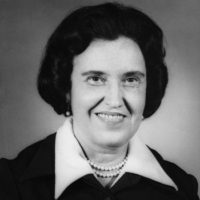
Rosalyn S. Yalow
Mt. Sinai School of Medicine, CUNY
For the development of the technique of radioimmunoassay.
Dr. Yalow is the first woman, and the first nuclear physicist, to win an Albert Lasker Basic Medical Research Award. Her radioimmunoassay work was done in collaboration with the late Solomon A. Berson, her associate from 1950 until his death in 1972.
Radioimmunoassay (RIA) is one of the most important clinically applied basic research advances of the past 20 years. The technique is an application of nuclear physics in medicine, because radioactive isotopes are used to measure the immunologic reactions.
By measuring precisely the differences between what is normal in biologic materials in health, and what is abnormal in them in disease, radioimmunoassay can determine what changes have taken place between the normal and disease states.
Radioimmunoassay was first applied in 1959 for measurement of the hormone insulin in blood, and soon revealed that the elevated blood sugar of adult diabetic patients is due to some factor interfering with the action of insulin, rather than to an absolute deficiency of insulin. Other RIA applications include determining whether the abnormally small size of some children is due to a deficiency of growth hormone; whether excessive production of steroids by the adrenal gland is due to tumor or to an overactive pituitary; and whether sterility is due to failure to produce, or secrete properly, sex-related hormones.
Radioimmunoassay is the method of choice for screening of blood used for transfusion to detect contamination with hepatitis virus; and for determining whether antibiotics or other drugs prescribed for treatment are at levels appropriate for therapeutic effectiveness.
For this revolutionary tool, now used in thousands of laboratories, which has brought about an explosion of new information leading to fresh insight and understanding in almost every aspect of clinical medicine, this 1976 Albert Lasker Basic Medical Research Award is given.
Rosalyn S. Yalow
Acceptance remarks, 1976 Lasker Awards Ceremony
Acceptance remarks, 1976 Lasker Awards Ceremony
The frustrations and frequent failures experienced by scientific investigators are compensated for by certain satisfactions. The most rewarding of these is the pleasure and excitement of having learned something that no one knew before. Then we enjoy communicating what we have learned, in the expectation that it will light the path for others.
I am pleased to accept this Award and to express my gratitude to the scientific community for its recognition of our work, by the ever-increasing applications of radioimmunoassay in biomedical investigation and clinical medicine. My joy at this time is marred only by the sadness that because of Sol Berson's premature death four years ago, he cannot share this moment with me just as we shared 22 years of collaboration in scientific discovery and adventure.
At this time when the people and their representatives in the government keep asking scientists—"What have you done for us today?"—it is important to remember that were we to gather 10,000 artists and give them paint, canvas, and money, we would be assured of many excellent paintings—but no guarantee of a Michelangelo or a Sistine Chapel.
Real progress in science continues to arise unpredictably from individual scientists or small groups. We cannot predict from which direction the next intuitive leap in research in diabetes, cancer, molecular biology, or the energy crisis will come. We can be certain only that the presence of a cadre of investigators with diversified training and areas of expertise, dedicated to the belief that the ultimate reward of science is its benefit to man, will assure that the time-lag between the generation of the idea and its practical application to the service of man will be minimal.
The first telescope opened the heavens; the first microscope opened the world of the microbes; the first prism brought forth color from white light; radioisotopic methodology, as exemplified by RIA, too, has the potential for opening new worlds in science and medicine. Thank you.
